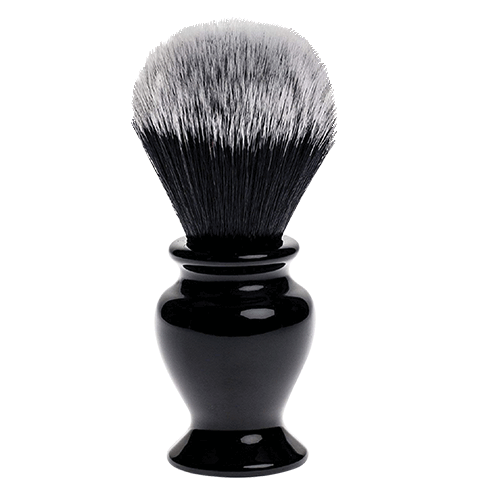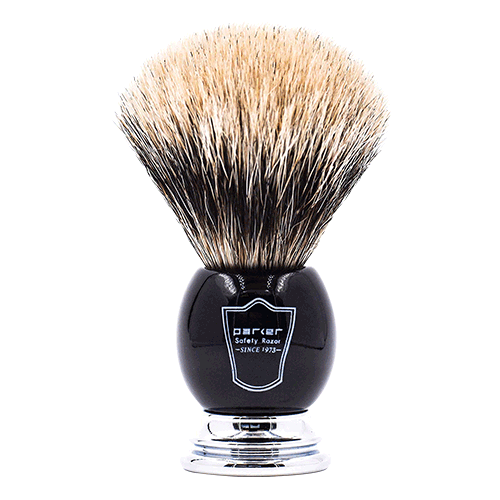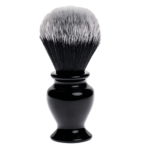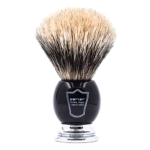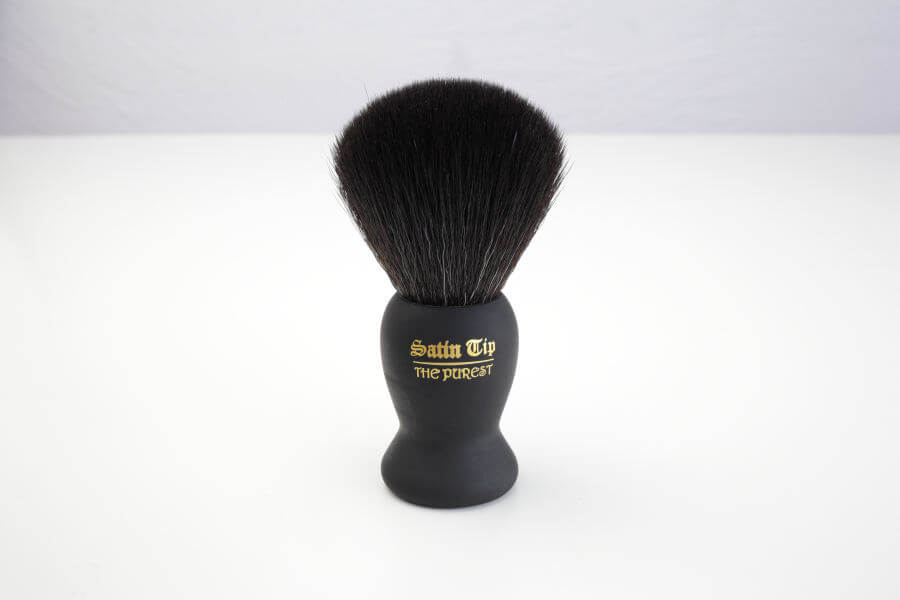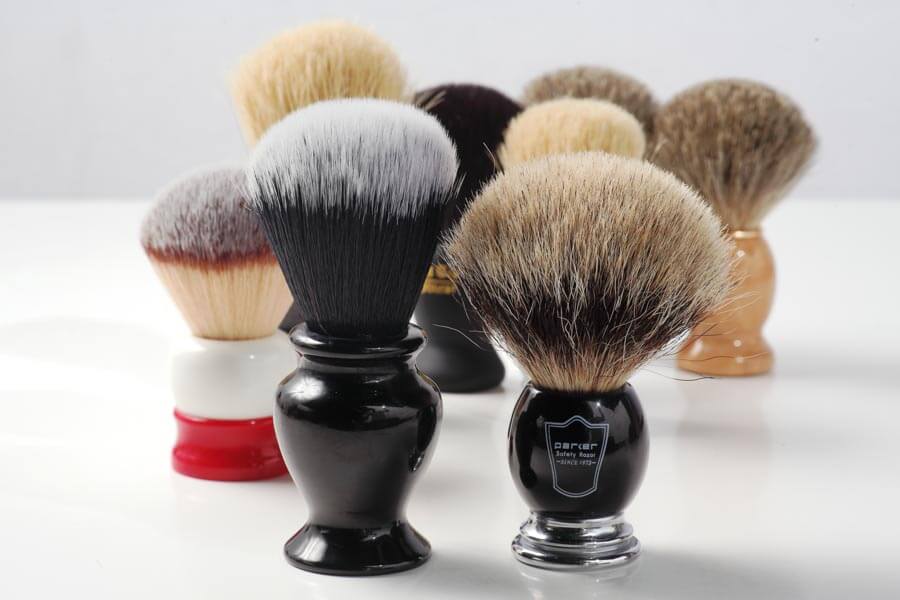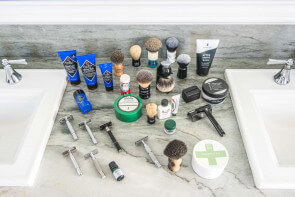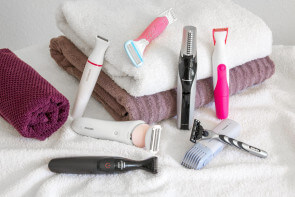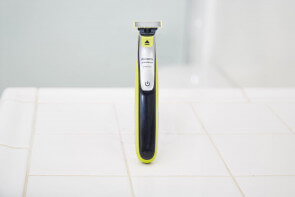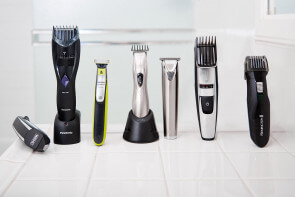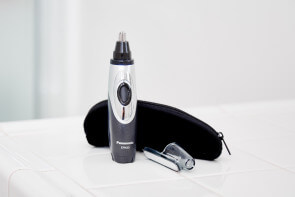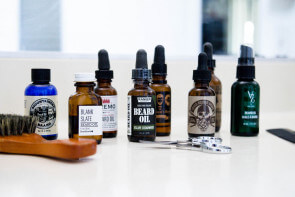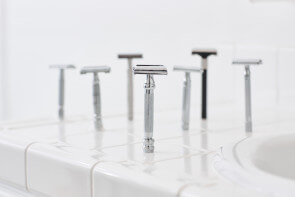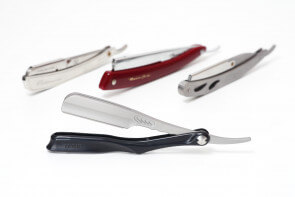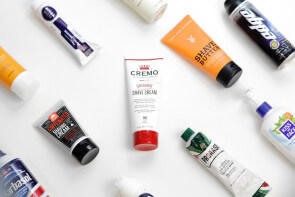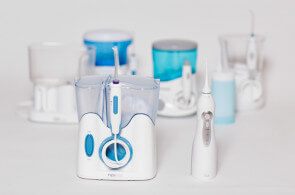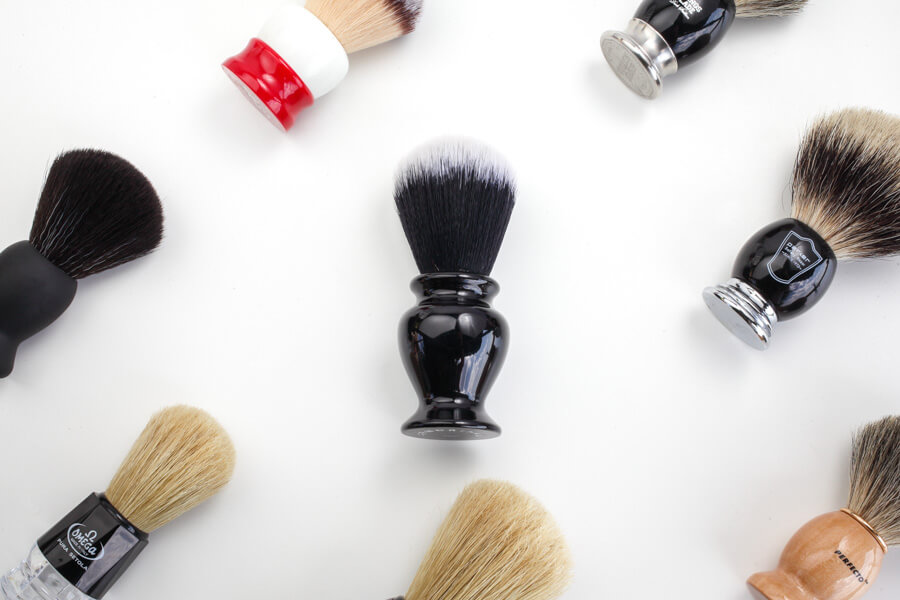
The Best Shaving Brushes
Our resident shaving nerd picked four old-school and four high-tech shaving brushes to put through the ringer during a month of intensive scrutiny. After all the foam was cut away, Fendrihan’s B&W Synthetic Shaving Brush is our pick for the best shaving brush and favorite way to whip up rich, creamy shaving lather. If you prefer natural fiber, the Parker – Pure Badger is a great option.
Our resident shaving nerd picked four old-school and four high-tech shaving brushes to put through the ringer during a month of intensive scrutiny. After all the foam was cut away, Fendrihan’s B&W Synthetic Shaving Brush is our pick for the best shaving brush and favorite way to whip up rich, creamy shaving lather. If you prefer natural fiber, the Parker – Pure Badger is a great option.
Table of contents
- The 8 shaving brushes we tested
- 1. Best overall: Fendrihan – B&W Synthetic
- 2. Best natural fiber: Parker – Pure Badger
- Other products we tested
- How we selected
- How we tested
- Why use a shaving brush?
- Important features to consider
- The bottom line
The 8 shaving brushes we tested
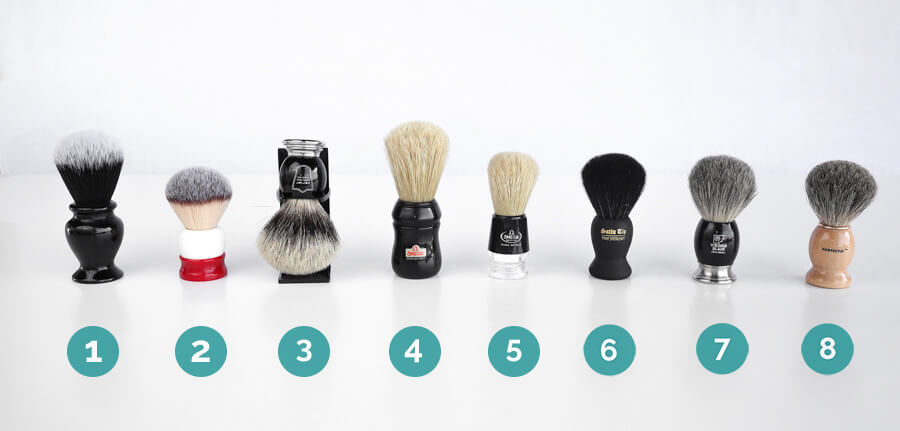
| Product | Price | Fiber | Loft (mm) | Weight (g) |
|---|---|---|---|---|
| 1. Fendrihan - Black and White | $$ | Synthetic | 47 | 103 |
| 2. Fine - Stout | $$$ | Synthetic | 38 | 66 |
| 3. Parker - Long Loft | $$$$$ | Badger | 48 | 115 |
| 4. Omega - Pro 49 | $$ | Boar | 55 | 67 |
| 5. Omega - S-Brush | $$ | Synthetic | 43 | 37 |
| 6. Satin Tip - "the Purest" | $$ | Synthetic | 51 | 47 |
| 7. Vikings Blade - Dark Stallion | $$$$$ | Badger | 44 | 125 |
| 8. Perfecto - 100% Original | $ | Badger | 41 | 40 |
1. Best overall: Fendrihan – B&W Synthetic

Fendrihan is a well-established purveyor of shaving and grooming supplies in Canada and the U.S., and they’ve always been a great place to get brushes from the high-end European makers. When they chose to put their name on a synthetic brush with a black-and-white knot, we had to try it.
What makes synthetic hair so great?
As with most of the new-generation synthetic brush fibers, this is soft to a degree that’s hard to describe. When it’s dry, if you rub your finger across the white tips, you’ll barely feel them. When loaded with soap, all you’ll feel is the lather moving around your face.
Softness is now a solved problem for synthetic hair. Some European brush makers have been selling ultra-soft synthetic brushes for a while; sellers of reasonably-priced brushes have sourced comparable fiber and caught up in the last few years. What has still been up for debate, though, is whether the fibers were too limp for effective use in a shaving brush. The engineers and designers went back to the drawing board and returned with a new fiber configuration.
The “tuxedo” synthetic hair has taken the world of shaving brushes by storm. In 2016, some brush makers did a group buy, and the fiber started showing up among artisans like Envyshave and Wolf Whiskers. Soon, Canadian brushmaker and supply-seller APShaveCo on Etsy began offering ready-to-purchase inventory, and eventually, Maggard Razors came along and exploded the brush’s availability.
Heralded as an answer to all the limpness of the Plisson-style synthetic brush, this is a bristle that matches the softest possible tips with just the right amount of spring.
Our researcher happened to already own an APShaveCo “Tuxedo” brush when we started working on this review, so he was intrigued when he saw Fendrihan’s Black and White Synthetic shaving brush show up in search results. (Especially at such a great price and with Prime shipping on Amazon.) As a new product, the volume of buyer feedback for this Amazon listing falls far below the threshold we usually set, but for an exciting new product from a known vendor we were willing to take a chance, and we’re glad we did.
Shaving performance
Fendrihan chose to set the fiber extending farther from the handle than most brush makers, and that seems to have actually increased the amount of “backbone” stiffness. It’s not nearly as stiff as a boar brush, but it’s a tiny bit stiffer than the other “tuxedo” brushes we’ve seen, and it’s certainly not limp.
The length of the brush also makes whipping up lather a bit easier, and if you splay the tips all the way out, it spreads the soap around your face nicely. This isn’t a specialized face-lathering or bowl-lathering brush, but it does a good job with both.
Water retention is also great: Synthetic brushes will always hold on to less water than natural hair, but with a longer loft Fendrihan’s brush won’t dribble away your soap mid-shave. You can pretty much dip this brush in hot water, give it a tap or a few shakes to shed excess water, and get to work on your lather.
When it comes to specific parameters like how long the hairs in your shaving brush are, there are no hard and fast rules: you buy a brush, and you adapt to it. This brush is by no means perfect. A badger brush like the Parker – Long Loft gives a different experience, bending around the contours of your face a bit more gently; the badger hair isn’t nearly as soft, though.
Construction and handle quality
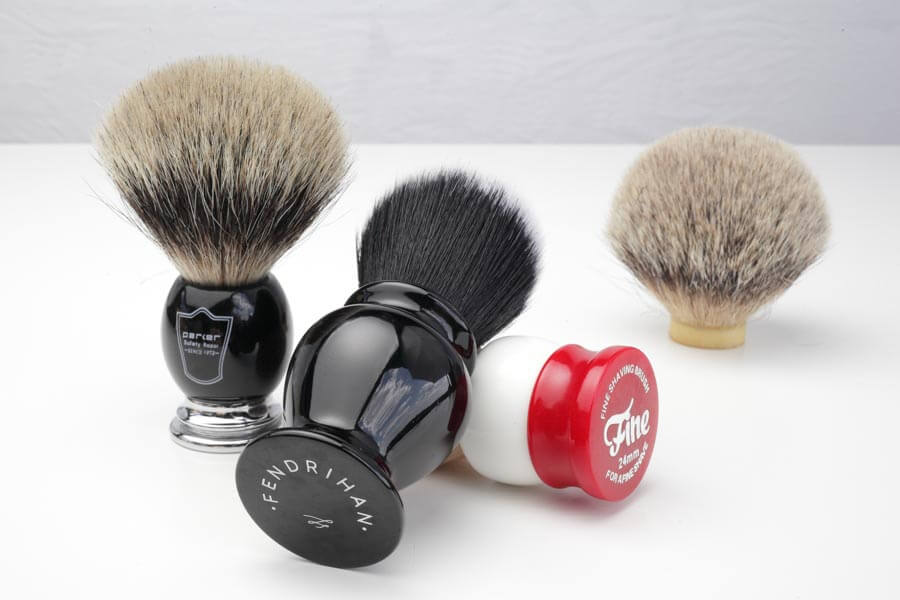
This is a relatively large brush and the heavy handle feels great. The polish on the black acrylic is beautiful, and the shape is reminiscent of a classical-era water pitcher or urn. The shape here seems designed more for looks than comfort, but it’s actually quite easy to grip and secure when you’re whipping up lather.
Shedding is still possible with synthetic fibers, but a well-made brush like this will never lose more than a few bristles. (We didn’t find any loose hairs when shaving or testing.) There is a tiny spot of clear glue seeping out of the handle, which is a bit disappointing given how great the rest of the brush is. You have to look closely to see it, but it’s visible under a bright light where it contrasts with the black bristles.
Compared to a few of the other tuxedo-fiber brushes we’ve seen, the line of black-and-white contrast coloring on this knot appears slightly less uniform. Custom brush makers have taken the look even further with knots like the “5th-generation Black Wolf”, but at less than $20 (compared to $80 and a long wait for custom production) we have no complaints about the quality or look of this brush.
Sizing up the competition
You could buy a brush with similar “tuxedo-themed” fibers from Maggard Razors or one of the pop-up brush makers and resellers on Etsy and Amazon. West Coast Shaving has a huge selection of handle styles to choose from on their site.
You can also get a brush with these fibers directly from Yaqi’s factory in China. Yaqi used to sell only in wholesale-sized lots on Alibaba, mostly loose brush knots to handle-making artisans and customized finished brushes to re-sellers like Fendrihan. Now that the secret is out, they’re even available on Amazon, imported and re-sold by Amazon storefronts like West Coast Shaving. We’ve sampled these brushes, and they’re everything you’d expect, but watch out for shipping and duty fees if you’re using eBay or Aliexpress.
Fendrihan is pricing very competitively, so buying their brush from Amazon is definitely the cheapest way to get one quickly. On top of that, their handle and the way this brush is designed are distinctive and attractive.
This a first-class brush with a unique character you really can’t get anywhere else, and at an amazing price. Fendrihan went the extra mile and turned a popular new fiber into a brush all their own, and it’s our favorite of the bunch.
Key takeaways:
- Fendrihan sells great products for discerning buyers. Their Black and White synthetic shaving brush has a signature look that echoes classical-era shapes in modern materials.
- While it’s not quite as natural-feeling when moving around your face as badger hair, the amazing softness of the high-tech fiber makes up for that in spades. It’s 100% cruelty-free, too.
- There are other brushes around that use similar fiber, but given the unique handle, the price, and the availability this is definitely the one we’d buy again.
2. Best natural fiber: Parker – Pure Badger
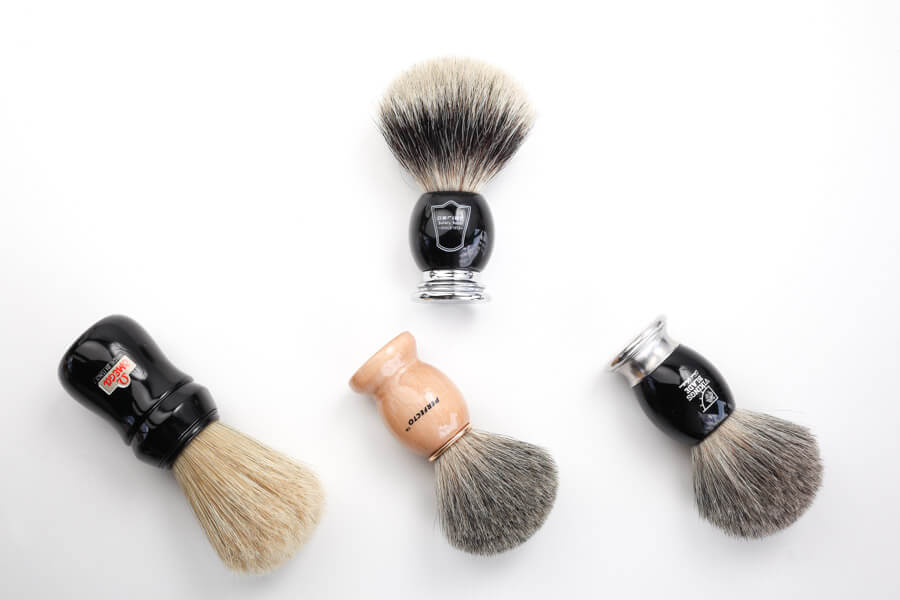
We almost despaired of finding a badger hair brush worth recommending at a price point lower than $60, but Parker has found a great source for the hair in this “Handmade Deluxe Long Loft 100% Pure Badger Shaving Brush”, and they’re offering it at a very good price. (Even more so when you factor the included stand, which would cost you at least a fiver on its own.)
What makes this a better badger brush?
Buying a badger brush can often feel like a gamble. The natural qualities of the fiber are ideal in many ways, but it takes careful selection of the right hairs to make a really great brush. Cheap badger hair is often scratchy, smelly, and set loosely in knots that are limp and shed every time you shave.
“Pure” badger is often the lowest grade available, but Parker has bucked the naming convention (they call their cheaper bristles “black” badger), and this is definitely the “best” grade of hair you’ll find for under $50.
The softness of the hair in this brush would have once been considered excellent. The hairs have natural tips, meaning that the shape of this knot has been carefully laid out rather than shaped with clippers. The scale has shifted with the advent of amazingly soft synthetic brushes, but this is still a nice brush to use.
The difference in softness compared to the other badger brushes we tested is noticeable, especially when swirling and pressing the hairs on your skin while the brush it wet. This is the softest natural hair we found inside our budget; “Silvertip” hairs will be softer, but at a price that becomes hard to justify when the brush still isn’t as soft as a much more affordable synthetic.
Construction and handle quality
The quality of the rest of this brush is very good, too. The handle is made of resin and metal. It’s heavy at the base and feels solid, but the design makes sure it isn’t too slippery the way some metal handles sometimes are. Parker sells a very similar model in faux horn, if that’s a look you prefer.
We saw a few hairs shed in the first week, but nothing unusual for a natural-hair brush. The hairs remind you that they are from an animal with a faint smell, if you’re a pet owner the smell will probably seem relatively pleasant: clean, but genuine.
The stand isn’t flashy, but it helps keep water out of the hairs to prolong the life of the brush. One of our few complaints about this set of brush and stand is that you almost have to squeeze the brush into the prongs of the stand. It doesn’t always hold the brush exactly vertical, either, without nudging it around to find a center point.
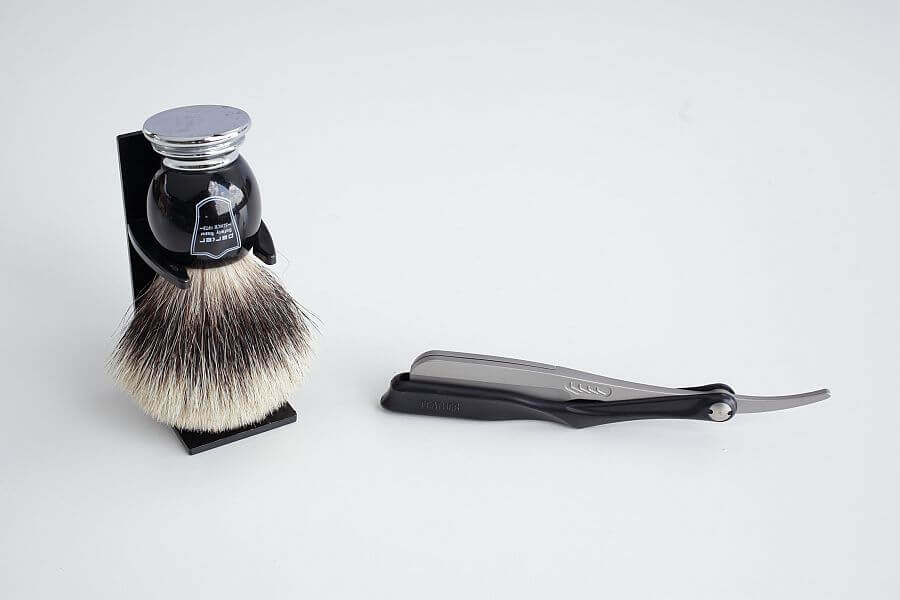
Shaving performance
Lathering in a bowl or on the face is exactly how it should be, as all the natural curves and kinks of the hairs move against one another and make billions of tiny bubbles.
Making lofty mounds of thick foam with unscented or Earl-Grey-scented harder soap was very easy, though Fendrihan’s stiffer synthetic brush does make it easier to pick up a hard soap. Taylor of Old Bond Street’s luxurious lathering creams (our pick for the best affordable lathering shaving cream) is very easy to “load” into brush tips, and the high-end scents will help if you dislike the faint smell of badger hair.
When you swirl the hairs of this brush around your face, there is a very small amount of poking and roughness from the natural qualities of the hair. It’s not uncomfortable the way the clipped ends of cheaper brushes can be, but it doesn’t exactly massage below the skin the way a stiff boar brush does either.
Basically, this is how shaving brushes have been expected to feel for almost 300 years, and if you didn’t have an expensive silvertip or impossibly soft synthetic brush to compare with, you might never want anything else.
Key takeaways:
- Parker’s Long Loft badger brush with chrome and black handle looks great and uses excellent badger hair.
- The price is moderately high compared to synthetic brushes like our top pick, but Parker is still giving you the traditional shaving experience for less than $40.
Other products we tested
3. Fine Accoutrements – Stout 24mm Shaving Brush
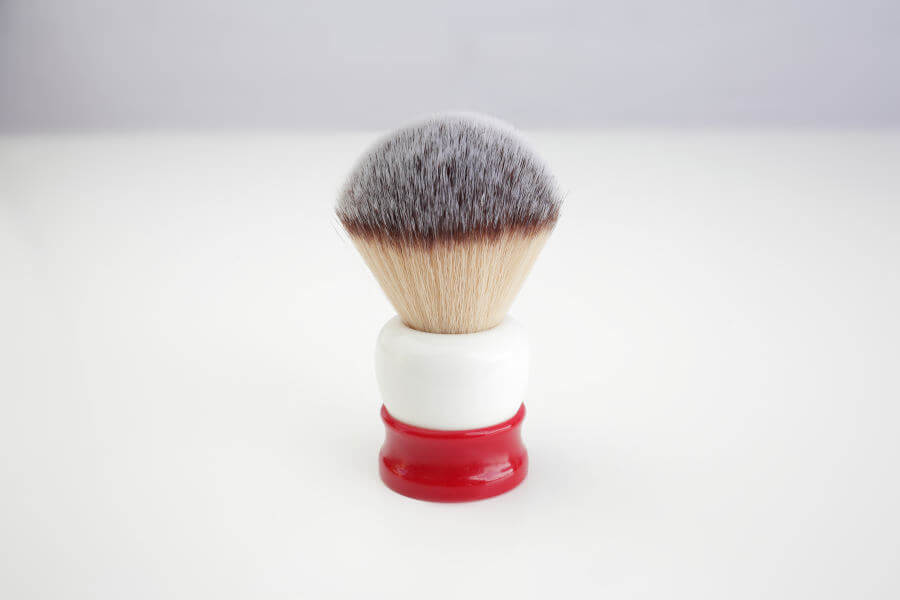
The “Stout” 24mm shaving brush is very much like the other synthetic brushes we tested but designed to excel specifically at lathering shaving soap directly on the face.
Fine Accoutrements started out on Etsy as a way for founder Todd Cerami to sell an affordable formulation of his favorite aftershave in scents he loves. He’s branched out into a number of shaving products aimed at frugal-but-hip enthusiasts, and this brush is a great example of that business model.
Mr. Fine seems to have based his “Stout” brush on the Simpson “Chubby” design, much beloved by those who prefer face lathering. This one will cost you much less than a Simpson, and with modern super-soft fibers, it is, for all intents and purposes, a better brush in every way.
The quality of the bristles is, as with most of the new synthetics, excellent. Soft tips with a good amount of resistance; the biggest difference between this brush and the Fendrihan really is in how the fibers are set in the handle.
These fibers are short, set deep into the handle, so they have a ‘backbone’ stiffness that’s very good for loading a hard soap and building up lather on your face. If the hairs were longer they might be too floppy, but that’s pure speculation. In this configuration, the brush works well
While this is an amazing brush for face lathering, those who like to whip up lather in a bowl whisk-style will probably prefer our top pick. The Stout’s shorter loft and handle can still whip up lather, but it’s not quite as easy to maneuver in the bowl as Fendrihan’s longer brush.
Fine Accoutrements seems to have styled their brush line after antique Ever-Ready brushes, and it matches Fine Accoutrements’ stacking soap bowls and other shaving products. If that’s a style you like, and face lathering is your preferred way to shave, then the price of this brush might be a bargain.
Because the Stout costs so much more than Fendrihan’s longer brush, though, and because it’s not as versatile, the Stout didn’t end up ranking #1.
4. Omega – “Pro 49”
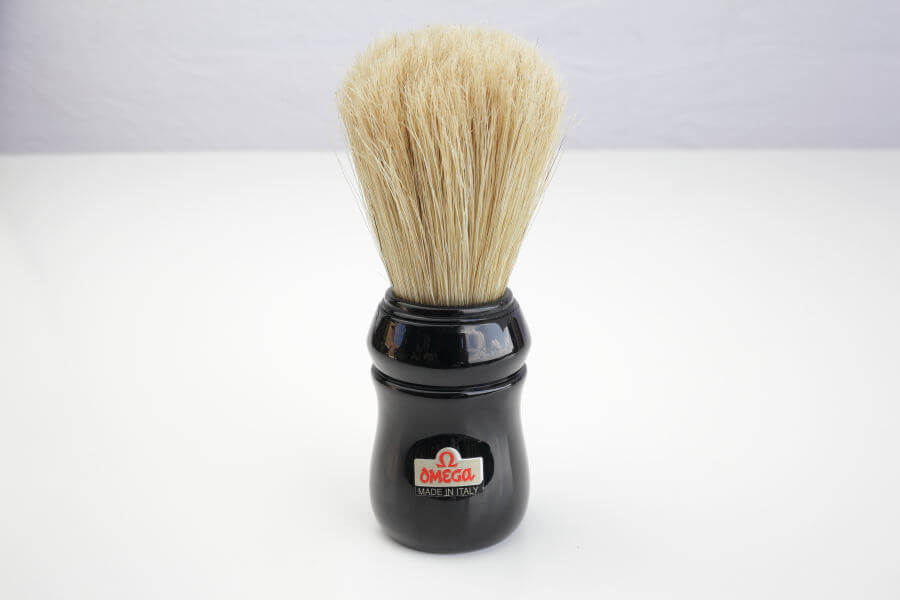
Boar brushes have many fans, and the Omega – Professional 10049 (dubbed “the Pro 49” by its fans) is a frequent recommendation. They were, once upon a time, an amazing value compared to badger, and once you get used to how stiff and scratchy they are, they work quite well. In the era of softer-than-soft and cheaper-than-cheap synthetic brushes, boar is losing ground.
For about the cost of a good sandwich, this is not a bad brush, but it smells like mothballs for a week, and it will shed a few hairs. (On the bright side, it doesn’t smell like a pig!) This handle is nice to hold, but it’s hollow plastic, not the dense bowling-ball-like acrylic resin of the better synthetic brushes.
5. Omega – S-Brush
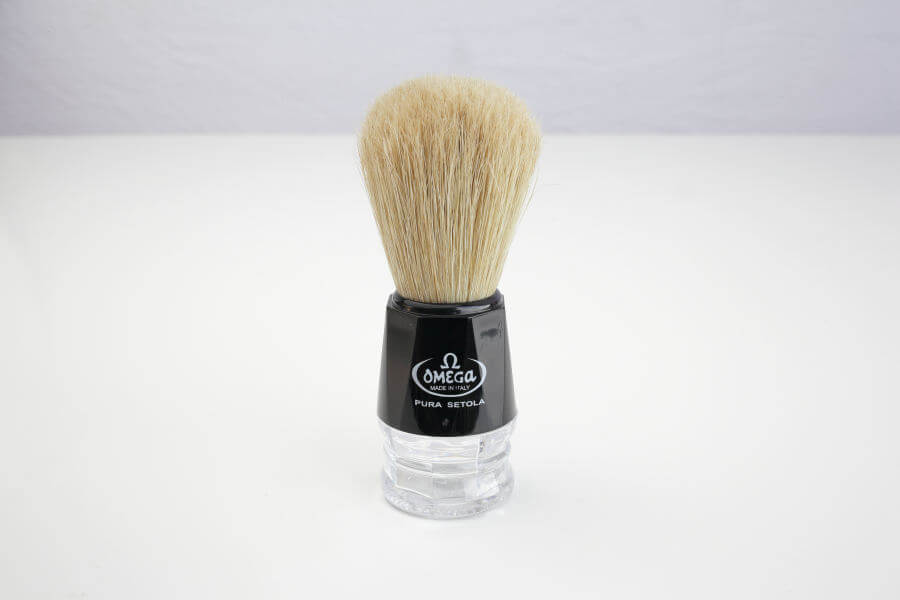
This is an interesting brush: like boar, but not like boar. Many reviewers note that that Omega’s S-Brush is “soft”, but it’s not anywhere near as soft as the other synthetics we tested. If you like exfoliating your face with a shaving brush, this is a vegan-friendly way to do so. It’s a good size for a travel brush, too.
On the whole, though, there never seemed to be that much reason to use this brush with all the others at hand. If you have beard and you only shave around the edges, a smaller brush like this will waste less soap; that’s probably the best reason to buy it.
Strangely, this brush also smells like mothballs when it’s new. Omega must be treating all their brushes with something before shipping. The smell goes away after you wash it out, but it’s a bit surprising to find in a synthetic-bristle brush.
6. Satin Tip – The Purest
“The Purest” is not the cheapest of the synthetic brushes we tested, but it probably should be. That’s not to say this is a terrible brush. Synthetic fibers are pretty much perfect, and this brush will do the job. Compared to our top pick, though, Satin Tip has not packed very much into this knot: with less density, it’s a tiny bit scratchy and disappointingly floppy.
There’s also the disappointment of a cheap plastic handle. The soft-touch coating isn’t bad, but it isn’t really very good, either. It reminds you of a cheap smartphone accessory more than a handcrafted artifact of a bygone era.
If you get this brush in a gift set, it will work for you and is certainly worth hanging onto as a travel brush. We wouldn’t seek it out, though.
7. Vikings Blade – Dark Stallion Luxury Badger Brush
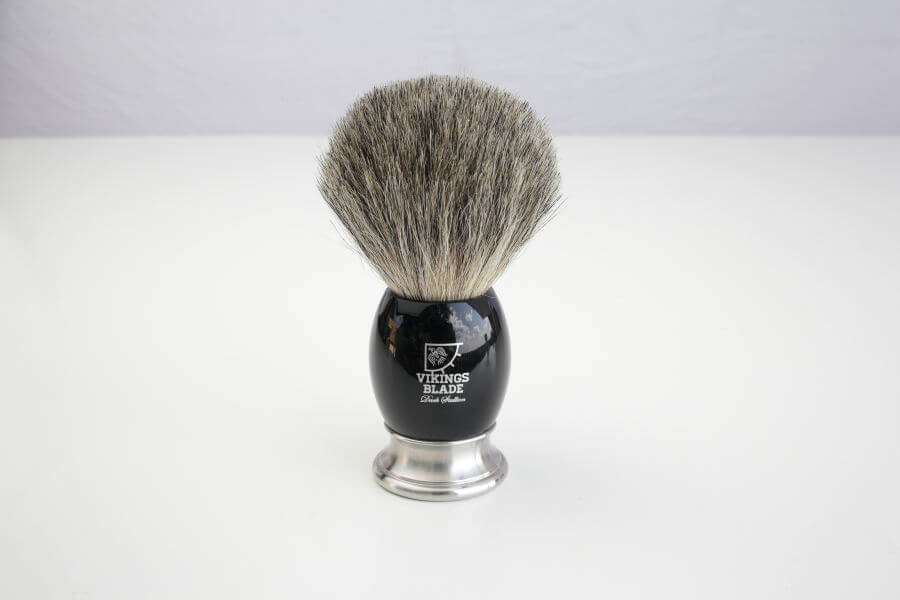
There’s a lot to hope for in the Dark Stallion; the “Vikings” at Vullion group in Australia have put together some shaving products that look great.
Sadly, the performance of this badger brush did not meet the high expectations set by the hefty handle and marketing. Compared to the other high-price brushes we tried, it’s not very soft. Worse, it smelled quite bad and sheds more than the ten-dollar brushes. (The Vikings spend more time drinking mead than preparing badger hair, apparently.)
The best thing that can be said about this brush is that the knot of hair is glued into a metal cup. This unscrews easily from the quite-nice handle, which might make it easier to replace the knot with something worthy of Scandinavian pride.
8. Perfecto – 100% Original
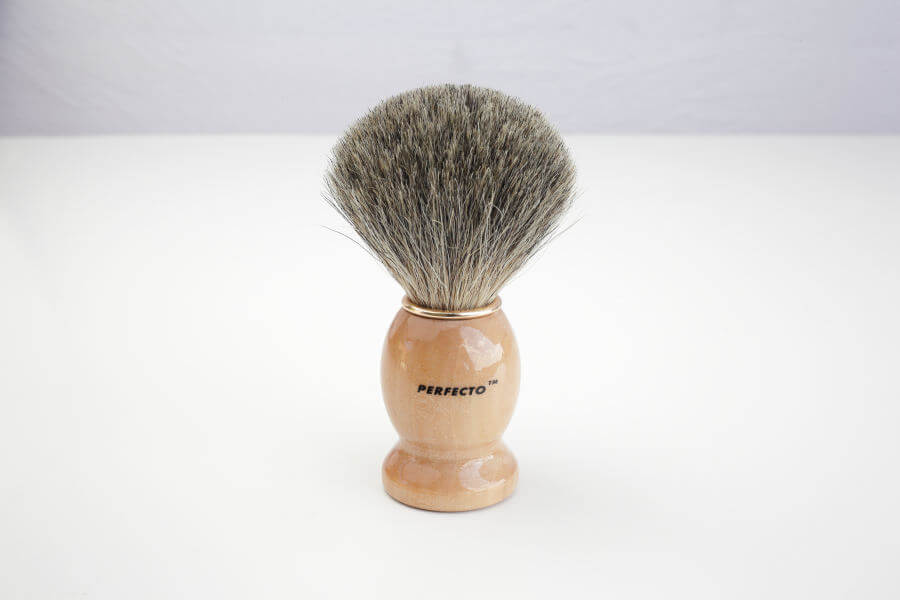
This Perfecto brush was not as bad as we’d feared, but it’s not a good brush. It will do the job, but the hairs are floppy, and they do smell at first — not just like a wet dog, but like a wet dog that got into the glue out in your workshop.
If it were softer this might have placed higher than the Viking brush. Despite all the problems that brush had, this one is still less pleasant to stroke across your face. Buy a synthetic or a boar, but don’t spend even $10 on cheap badger hair.
How we selected
Budgeting for a shaving brush review is tricky. The best brushes, some would say, must surely be those that use hand-picked knots of “silvertip” badger hair and cost hundreds of dollars. Our tester for this review owns a custom-made silvertip brush, and he likes it a lot.
On the other hand, we have a new generation of synthetic-bristled brushes that are as soft as (if not softer than) those very best badger-hair brushes and cost less than $30.
Our research delved into the reports of enthusiasts and experts in the wild world of wet shaving. Communities like BadgerandBlade.com or theShaveDen.com (not to mention the always-dramatic discussions at r/wicked_edge) are full of reports and discussions of the best brushes.
Professional reviews from the crew at Sharpologist.com, as well as blog posts and a host of YouTube reviews and podcast episodes from the most enthusiastic of enthusiasts deepened our knowledge of the terminology and technology of brush-making.
Customer feedback ratings, as always, steered our selections toward the final contenders: When we looked for brushes that are on the budget end of the spectrum, we tried to find cheap brushes that at least most buyers say they like.
We settled on buying four synthetic brushes from well-known sellers and four of the best-reviewed and most popular animal-hair brushes. We picked brushes that represent value purchases rather than handcrafted luxury, but tried to find a good range of pricing.
We considered including horsehair brushes in this review, but while there are some contenders, none of them really managed to compete on performance or quality. The place where horsehair generally makes sense is if you want a natural-hair brush with long hairs that’s softer than boar and cheaper than badger, but we don’t think they represent a better value for most shavers — especially since bigger brushes encourage over-use of your cream or soap. Horsehair also has a reputation for a bad smell that takes a long time to fade, and reports of shedding are prolific.
The black and white synthetic fiber used in Fendrihan’s brush represents a new generation of brushmaking. Synthetic fibers have been developing at an ever-increasing rate, and in the last year, so-called “tuxedo” brushes have been all the rage among those with access to custom-made brushes using experimental fibers. There are a few other places you can get a brush that looks like this: Maggard razors was the first retailer to offer the style. Fendrihan is an established vendor, though, and Amazon has its brush available to a wide audience with all the Prime perks.
How we tested
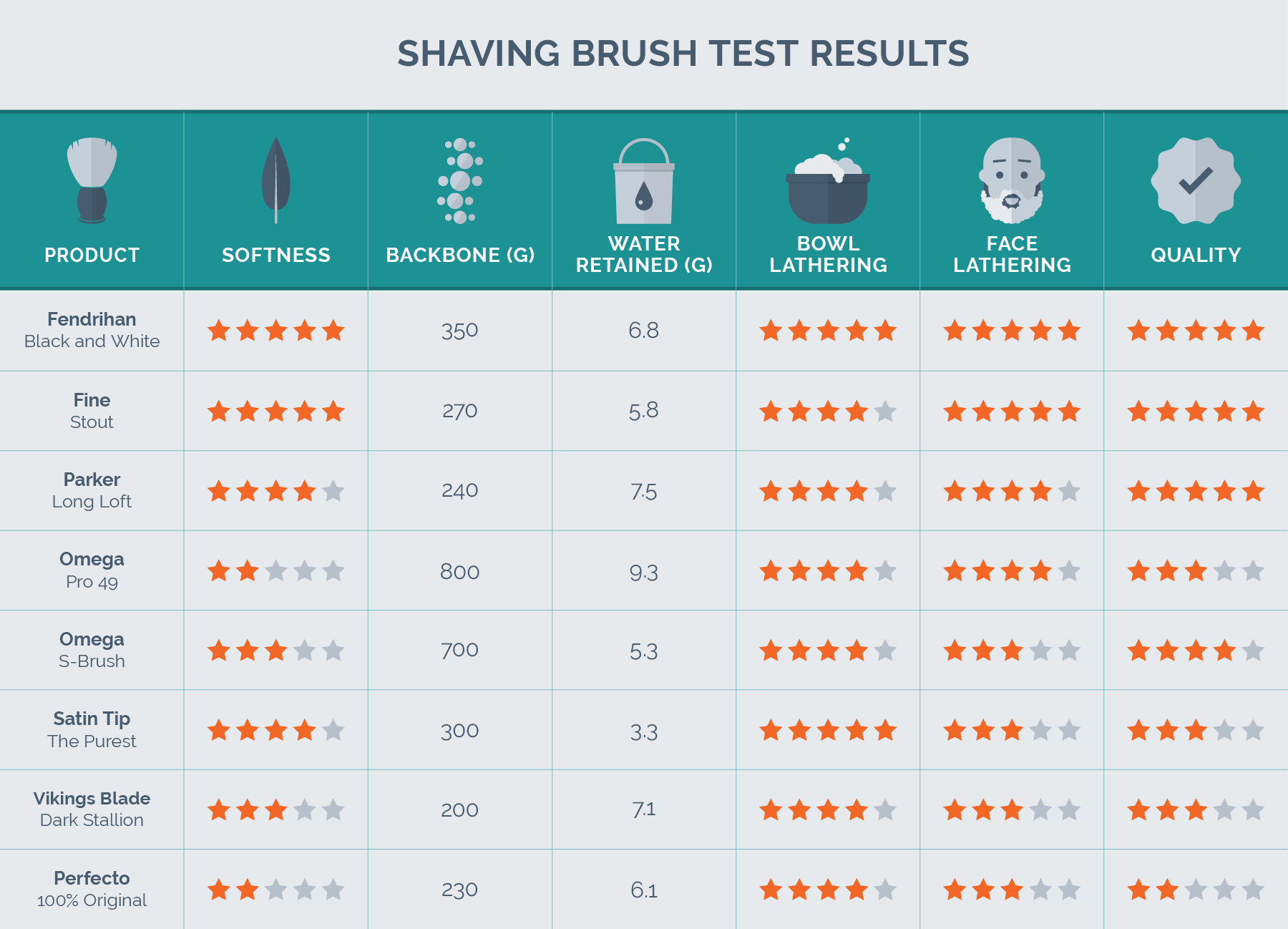
We used these eight brushes for daily shaving with a variety of soaps and creams (including the lather-friendly creams from our shaving cream review). We spent the most time lathering Van Der Hagen – Unscented Luxury shaving soap, a good baseline for quality of lather that didn’t hide the smell of the stinkers.
We also tested Barrister and Mann’s artisan-made tallow formula with all the brushes, but a high-end soap like this one lathers so easily we didn’t consider it much of a challenge.
Softness
We asked a few volunteers to help us blind-rank the brushes from softest to prickliest. Note that natural fibers will get softer over time, especially boar hair and clipped hair like Perfecto and Viking use, but in general, the ultra-soft tips of the new synthetic brushes are softer than any natural hair can ever get.
Some say that they enjoy the “scritchiness” of natural hair when rubbing soap into their skin, and we wanted to make sure we were judging other characteristics just as carefully as softness; it’s difficult to argue that softer is worse, though.
Backbone
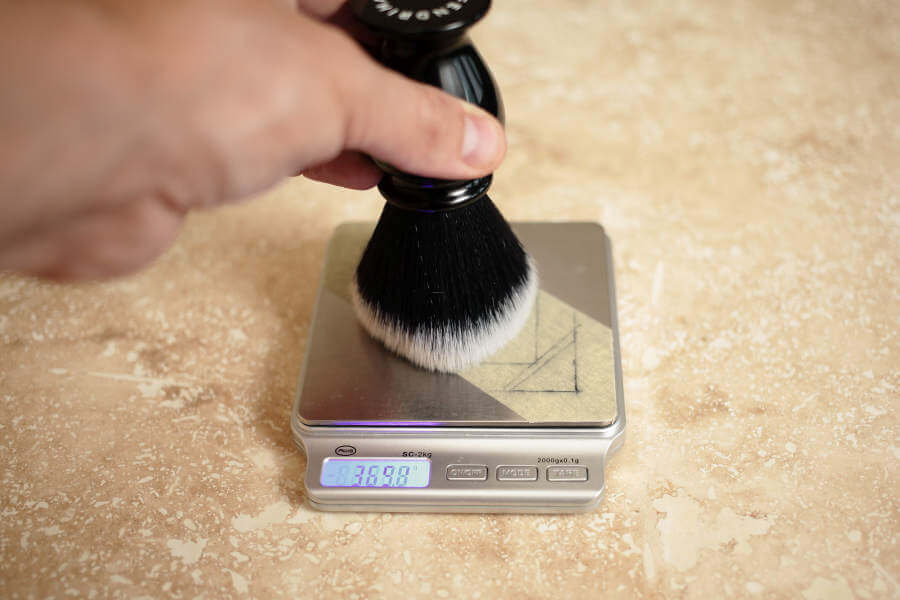
Shavers who use hard soap and lather directly on their faces will often complain if a brush is too floppy. The term “backbone” isn’t rigorously defined, and we haven’t seen anyone test for it in a controlled way, but it’s an accepted value among enthusiast reviewers.
We used a very precise and accurate benchtop scale to measure the pressure required to spread apart the bristles of each brush. The pressure will rise as more weight is put on the handle until the fibers “break” apart, which is the point at which the softness and stiffness of the hair-tips are in full effect.
There’s a complex relationship at work here between the flexibility of the fiber, the diameter of the ‘knot’, how densely packed the fibers are, the way the fibers rub against each other and the length of the fibers. There’s no “best” backbone number but as a point of reference: Many have complained that some small badger or synthetic brushes (like the Satin Tip or Perfecto) don’t have enough, while others will say that boar bristles have too much.
There’s plenty of room for individual preference, but we were very pleasantly surprised with the way the Fendrihan and Fine Accoutrements brushes behaved. A good badger brush like Parker’s performs very well, while the other badger brushes were quite floppy.
Water retained
We soaked the brushes in hot water, and then shook them out, two sharp flicks for each brush. (We tried the routine a few times to make sure we were getting reliable results.) We compared the ‘wet’ weight against the dry weight of each brush to determine approximately how much water the bristles can trap.
The number of grams of water retained in the bristles tells you something about how much water you’ll need to add when you start lathering your soap, but it’s also an indicator of density: The denser the hair, the more water will be retained.
Bowl lathering
We ranked the brushes for how easily and effectively they lathered soap in a bowl. (This is not entirely unlike making whipped cream or meringue with a whisk.) The most important factors here are how easy the brush is to hold, how long the fibers are, and how effectively the fibers splay out as you apply the foam to your face (or legs, or whatever else you’re shaving).
Face lathering
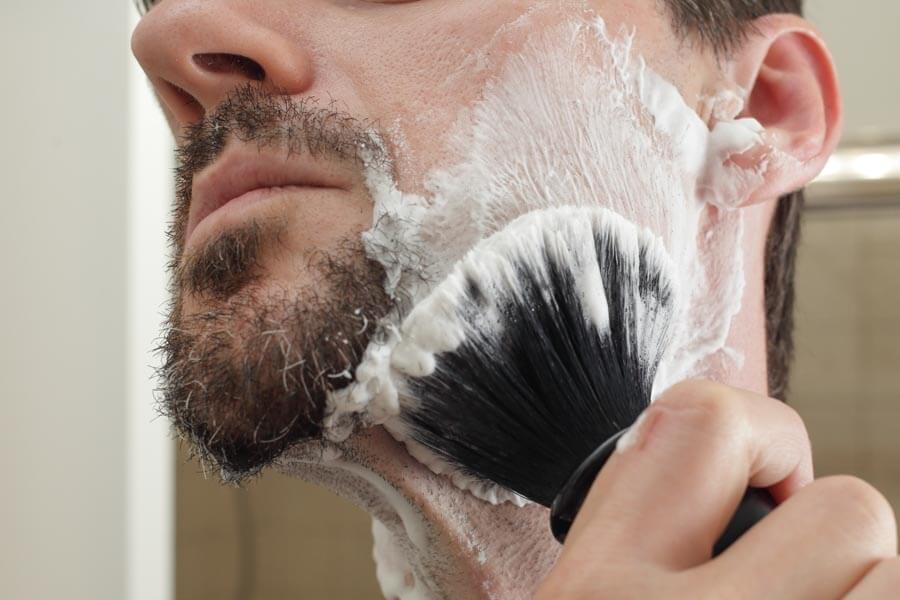
We ranked the brushes for how well they performed when building foamy lather directly on the face. This method of applying soap means every factor is under scrutiny.
As you can imagine, softness is very important, but the amount of resistance the fibers give is important too. If you’re just “mopping” the soap around with floppy bristles you won’t get much lather. Boar brushes are often preferred for this method because they’re stiff (some like the way they massage and exfoliate while lathering).
Quality
There’s a big difference between a good cheap brush and a lousy cheap brush. We docked points for smelly hairs (yes, the smell washes out, but it can be pretty gross), cheap handles, and, worst of all, shedding.
We expect a few hairs to come out of a brush when it’s new, but even after using these for four weeks, the Vikings Blade brush in particular will still release multiple hairs during a shave. (It’s not a cheap brush, either.)
Why use a shaving brush?
Opinions vary about exactly how important a shaving brush is to achieving the very best shave. Some claim that the brush lifts and scrubs your stubble hair to prepare it for the razor, while others say that if you take a hot shower before you shave you’ve done all the preparation that can possibly be done.
Historians don’t seem to know exactly when brushes were first used for shaving, but it was probably by the French, and they probably did it mostly to avoid having a barber rub a cake of soap directly on a client’s face. (This prevents social awkwardness when you’re shaving an aristocrat, but it also helps keep the soap clean.)
As time passed, the creamy, thick lather that a brush produces became more and more an expected part of shaving. We can’t say a brush is a necessary part of a great shave, but once you get the hang of it lathering shaving soap might be one of the most enjoyable parts of a daily shaving routine.
If you want to use the very best in hard shaving soap, which will often give you more shaves-per-dollar than canned gel, a shaving brush is pretty much required to get the best performance from the soap.
Loading just the tips of a wet brush helps you get hard soap off the puck and avoids waste created even with soft shaving cream. The brush then makes a lather (whipped like egg whites in a separate lathering bowl or directly on your face) that brings out the very best qualities of the soap.
Important features to consider
Fiber
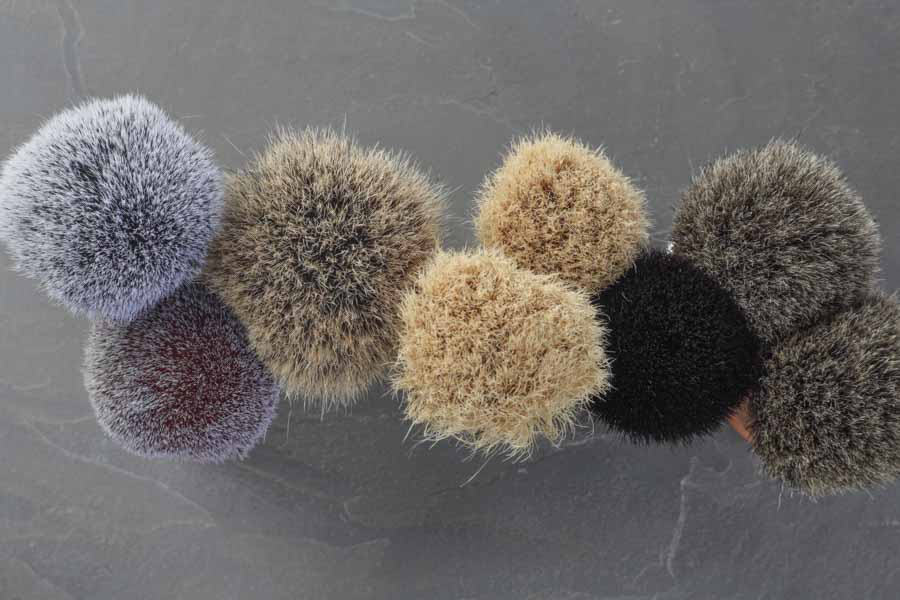
Natural fibers used to be the only viable bristles for a good brush. Those hairs vary in length, diameter and even in the softness of the tips (which will be scrubbing your face).
Real hair has two unique properties: it absorbs water (which can help you get the right amount of water into your shaving cream or soap), and it gets softer with time, as the ends of each hair begin to split. On the downside, it’ll take longer to dry out the brush, and along with “shedding” from a new brush, animal hair often has a distinctive (and sometimes unpleasant) smell.
There are ethical considerations to make when you’re purchasing animal products, too: Badgers and boars are almost certainly confined and killed before their hairs are clipped off.
Badger hair has long been sought after for brushes of all types, preferred by painters, makeup artists, and barbers. Good badger hair is soft, strong and has almost exactly the right amount of flexibility for a brush you’ll mash into your face.
This hair is graded by suppliers and manufacturers, but the grading labels are a bit tricky.
While “Pure Badger” is a promise that the badger hair is real, and “Best Badger” is almost certainly going to be better hair than that, in higher grades the names can mean anything and everything. People will tell you different grades come from different parts of the badger, but they can’t even agree on which parts go with which names. More expensive brushes like “silvertip” or “super badger” should certainly be softer than “pure,” but when comparing one maker to another there’s no hard and fast rule.
We don’t think anything above $40 is a good value unless you’re a devoted enthusiast seeking the ultimate brush. Even among the “pure”-grade brushes, though, there is a difference between hairs carefully packed in a bulb-shaped “knot” and those hairs simply bunched together and clipped to shape.
Parker says on their website that their “pure badger grade is comparable to many of the brushes that other companies market as ‘best badger’ and ‘fine badger.’” (What a headache!)
In the long run, while badger hair grades mean something, you generally have to try a brush to know what you’re getting.
Boar bristles are mostly collected from pigs or hogs. (There’s not much agreement on what to call the animals themselves, so we try not to spend too much time thinking about the inconsistency there.) The hair is thick, absorbs plenty of water, and is quite stiff and springy.
Boar hair is popular among those who want a brush that has a ton of “backbone” to massage and exfoliate the face at the same time as whipping up soap into a smooth and protective froth. The downside is that it’s rougher than badger, though it will break in and get softer over time. Every once in a while, enthusiasts who like the firmness of a boar brush will debate the merits of accelerating the break-in period with cold water and hair dryers.
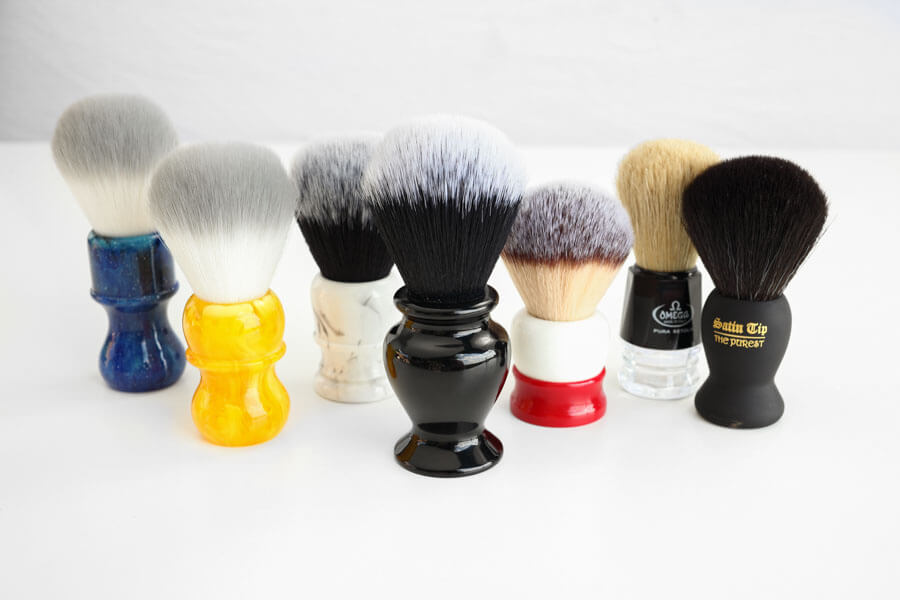
Synthetic fibers used to mean, basically, toothbrush bristles; not very pleasant. In those days pretty much the only people who wanted synthetic fibers in a shaving brush were vegans because they didn’t have a choice. (The Body Shop has sold a house-brand synthetic brush for decades, though it’s not soft enough to make our list of finalists.)
In the last several years, though, brush makers have discovered a new generation of carefully engineered bristle fibers from big-name industrial producers like BASF and Dupont. These fibers were probably first designed for painters, but they work very well for shaving brushes.
Manufacturers and retailers don’t divulge much about where their bristles come from (much less who assembles the brushes), but French brush maker Plisson is widely regarded as the first to sell synthetic fibers soft enough to really compete with badger hair. Plisson doesn’t seem entirely interested in U.S. sales, and the brushes that once showed up in L’Occitane stores have not been re-stocked.
Fortunately, North American purveyors at Italian Barber found a similar source (if not the same source) for the fiber, and the “Plissoft” brush was born. Others have followed suit, and we now have nearly every shaving specialty retailer selling their own super-soft synthetic brush, all available at an astonishing value.
Based on what we’ve learned from contacting designers, vendors, and a contact at Yaqi Brush Product Co., the fibers in our favorite two synthetic brushes probably come from a BASF facility, and the Satin Tip might use a Dupont fiber. The diameter of the fibers and crimping may have been tweaked for each design, but they have similar properties compared to animal hair.
Omega is using a synthetic fiber that, wherever it comes from, is much thicker and stiffer. It’s soft enough to use, about as soft as broken-in boar hair, but it’s not nearly as velvety as the other synthetics.
Natural hair is pretty durable, but the hairs will weaken and break over decades of use. A synthetic brush will probably last for as long as you will if the glue holds it in the handle.
Size and Loft
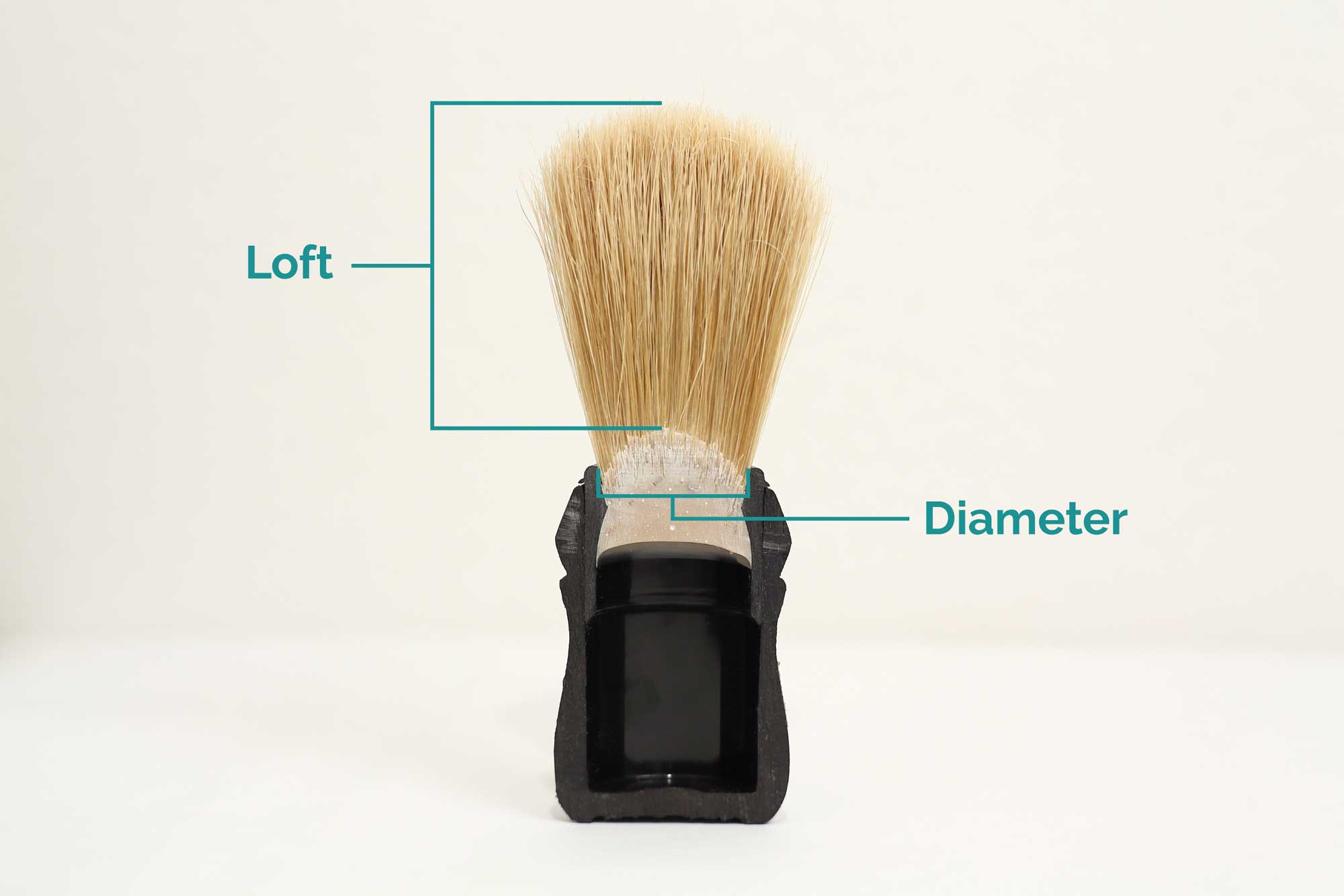
The way a brush maker chooses to size a “knot” of fiber and set it into a handle will play almost as important a role as the fiber itself, especially now that synthetic fibers have leveled the playing field for softness.
Many have noted the way fibers that are limp on their own can get a usable backbone if packed into a knot with the right diameter and set at the right depth inside the handle socket. On the flip side, a fiber-like badger that’s well-known for good performance can be floppy and unsatisfying in a too-small knot or with too much length.
Diameter is measured at the base of the knot, and loft is the length of hair that comes out of the handle. Since gluing technique sometimes makes fibers shorter in the center of the knot (a “glue bump”), that’s where we measured for our chart.
24 mm is the median-knot diameter we were aiming for, as it gives you enough brush to quickly whip up a lather and cover your whole face. Giant 30+ mm brushes are becoming more and more popular, but a brush that big only really makes sense if you need enough lather to cover a bigger area like your scalp. On the other end of the scale, a 20 mm brush is a little bit less luxurious and takes longer to whip up lather, but if you’re only shaving part of your face it might help you to avoid lathering soap you won’t actually use.
The bottom line
A shaving brush is one part functional tool, a one-part luxury accessory. This is a purchase that brings you into a circle of enthusiasts who are so excited about shaving that they start to collect brushes, razors, soaps, and aftershave scents.
If you’re looking to participate in the tradition of “le blaireau,” a way of shaving that originated before the revolutionary wars, then Parker’s Long Loft Badger brush is a great buy. The hairs aren’t as soft as our synthetic pick, and it’ll need more careful rinsing and drying, but it’s a piece of gear you can be proud of.
The best news is, Fendrihan’s Black and White Synthetic brush is well-made and affordable. The classy looks, soft fibers, and great lathering performance would be a great addition to anyone’s morning shave routine. It’s a safe gift for vegans, too.
More Reviews
Oneblade - Core + Black Tie Kit
Philips Norelco - GoStyler
Philips Norelco OneBlade Review
Philips - OneBlade
Wahl - PowerPro 9686
Panasonic - ER430K
Mountaineer Brand
Parker - 99R
Feather - Artist Club SS
Cremo - Original Shave Cream
Maxxima - LED Multi-Color
h2ofloss - hf-8


